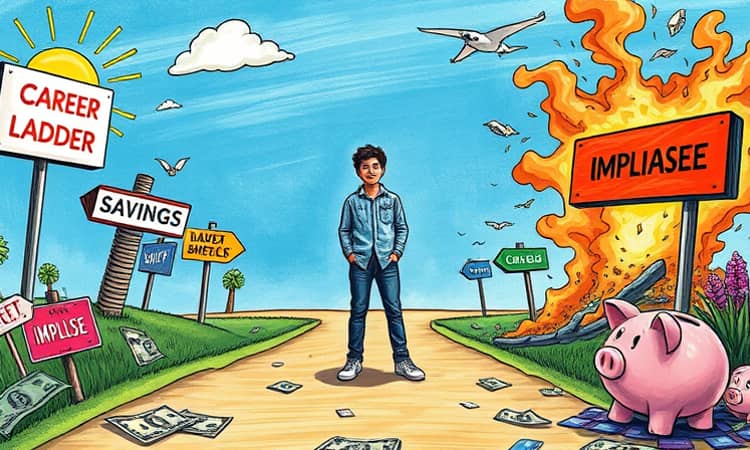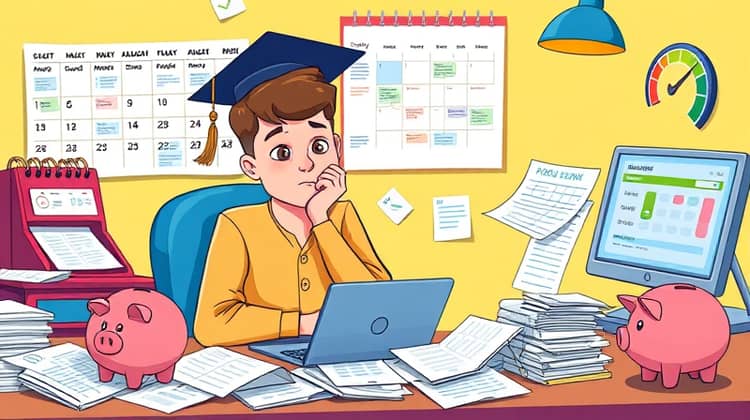Financial Pitfalls in Your 20s: 10 Mistakes to Avoid at All Costs

Navigating your 20s can be an exhilarating yet daunting experience with so many new responsibilities, especially regarding financial decisions. Making wise choices now can set the foundation for a secure future, while poor choices can lead to setbacks that may take years to recover from. In this blog post, we will explore 10 financial pitfalls commonly encountered by individuals in their 20s and provide helpful tips on how to avoid them.
Understanding these pitfalls is essential for anyone looking to establish a stable financial future. Your 20s are often characterized by newfound independence, potential career opportunities, and sometimes impulsive spending. Being aware of common mistakes can empower you to make informed choices that will benefit you in the long run.
Let’s dive into the key financial mistakes to avoid during this critical decade of your life.
1. Ignoring Budgeting

Budgeting often feels tedious and limiting, leading many young adults to overlook its importance. However, establishing a budget is one of the foundational aspects of maintaining financial control. Without a budget, it's easy to lose track of where your money goes and end up in financial distress.
In your 20s, expenses can seem sporadic and unpredictable, from rent and groceries to entertainment and social outings. Creating a budget helps you allocate funds thoughtfully and can even highlight unnecessary expenditures that you can cut back on.
By understanding your financial inflow and outflow, you can make conscious decisions about saving, investing, and spending, allowing you to enjoy life without financial stress.
- Track your income and expenses diligently.
- Identify areas where you can cut back.
- Revisit and adjust your budget regularly.
In the long run, a good budgeting habit can prevent the development of habits that lead to financial instability and anxiety.
2. Accumulating Credit Card Debt

Credit cards can be both a blessing and a curse. They offer convenience and can help build credit if used wisely; however, many young adults find themselves deep in credit card debt due to unchecked spending habits. Accumulating debt can create a cycle that is hard to break, leading to exorbitant interest payments and long-term financial issues.
In your 20s, the latest gadgets, fashionable clothing, and dining experiences can be tempting. Overspending on credit cards without a solid payment plan can quickly spiral out of control. Prioritizing immediate gratification over long-term financial health is a common pitfall that can take years to resolve.
To avoid falling into this trap, it is crucial to understand how credit works, including interest rates and the impacts of late payments on your credit score.
- Only spend what you can afford to pay off each month.
- Beware of accumulating interest on unpaid balances.
- Set up automatic payments to avoid late fees.
By managing your credit cards responsibly, you not only protect your financial future but also build a positive credit history that will benefit you for years to come.
3. Not Saving for Emergencies

Emergencies can strike at any time, whether it’s a medical issue, car repairs, or unexpected job loss. Therefore, having an emergency fund is vital, especially in your 20s when your financial situation can be precarious. However, many young adults neglect to prioritize savings, often feeling invincible in their youth.
Without an emergency fund, you place yourself at risk of falling into debt when life throws you a curveball. The peace of mind that comes with having a safety net allows for better decision-making. Even small, consistent contributions to savings can make a significant impact over time.
An emergency fund should ideally cover three to six months of living expenses, and starting small is always better than starting late.
- Set a savings goal and timeline.
- Open a separate savings account for emergencies.
- Automate your savings deposit to ensure consistency.
Taking proactive steps to build an emergency fund can save you from stress and financial difficulty when unexpected situations arise.
4. Skipping Retirement Savings

It’s easy to feel invincible in your 20s, leading to the notion that retirement is a distant concern. However, the earlier you begin saving for retirement, the more time your money has to grow. Skipping retirement contributions now can significantly hinder your future financial health.
Many employers offer 401(k) plans, sometimes with matching contributions, which can be effectively “free money” towards your retirement savings. Yet, younger workers often forgo these opportunities in favor of immediate spending.
Consistent contributions—even if small—will compound over time, creating a more comfortable retirement down the line.
- Take advantage of employer-sponsored retirement plans.
- Consider setting up an IRA (Individual Retirement Account).
- Commit to auto-increase your contributions when you receive raises.
Even small sacrifices today can lead to a wealthier future, allowing you to enjoy your retirement rather than worrying about finances.
5. Overspending on Lifestyle

The desire to fit in or impress friends can lead to overspending on lifestyle choices. From the latest fashion trends to extravagant outings, it's easy to give in to social pressures, resulting in financial strain. Many 20-somethings often conflate their self-worth with their material possessions, leading to poor spending habits.
Recognizing that experiences, such as travel and quality time with friends, can often be more valuable than flashy items is essential in building a sustainable lifestyle. By shifting your mindset to value meaningful experiences rather than purchases, you can cultivate a healthier relationship with money.
Prioritizing financial responsibility doesn't mean sacrificing enjoyment; it means making smarter choices to create a life you love without the associated debt.
- Create a monthly entertainment budget to limit overspending.
- Seek out cost-free or low-cost activities with friends.
- Consider buying second-hand or renting items instead of purchasing new.
By establishing healthy spending habits early, you can lead a fulfilled lifestyle without breaking the bank.
6. Neglecting Student Loan Debt

Many graduates emerge from college burdened with student loans, and it’s easy to fall into the trap of putting off repayment. Neglecting student loans can lead to serious consequences, including accruing more interest and damaging your credit score if payments are missed or delayed.
In your 20s, it’s crucial to have a clear plan for managing your student debt. Understanding the terms of your loans and exploring repayment options available can make a significant difference in managing your financial well-being.
Consider refinancing or exploring income-driven repayment plans to make monthly payments more manageable.
- Track your loan balances and monthly payments.
- Set up automatic payments to simplify the process.
- Explore loan forgiveness options if applicable.
Being proactive about managing student loans will help you stay ahead financially and prevent overwhelming debt burdens in the future.
7. Failing to Invest

Investing is often viewed as intimidating, particularly for those just starting in their careers. However, delaying investing means potentially missing out on significant growth opportunities over time. The earlier you begin to invest, the greater your chances of building long-term wealth.
By failing to invest, you risk missing out on the benefits of compounding interest. Even small monthly contributions to investment accounts can grow significantly over time, creating wealth that can set you up for financial success.
Take the time to educate yourself on various investment vehicles, such as stocks, bonds, and mutual funds, to establish a well-rounded investment portfolio.
- Start with foundational investment accounts like IRAs or stock brokerage accounts.
- Diversify your investment portfolio over time.
- Educate yourself by attending investment workshops or reading books.
Investing is a crucial aspect of financial independence and growth, and the earlier you start, the more you'll reap the rewards in the future.
8. Not Understanding Credit Scores

Credit scores play a crucial role in your financial life, influencing everything from loan approvals to interest rates. Yet, many young adults remain unaware of how their actions affect their credit scores. Understanding credit is essential for making sound financial decisions.
Ignoring your credit score can lead to consequences down the line, including being denied loans or facing significantly higher interest rates. Regularly monitoring your credit score can help you identify issues early and address them proactively.
Taking steps to improve your credit score isn’t difficult; it requires mindfulness regarding credit utilization and payment history.
- Pay your bills on time to build a positive payment history.
- Keep your credit utilization ratio below 30%.
- Check your credit report at least once a year for errors.
Being informed about your credit score and its factors can empower you to make better financial choices and improve your overall financial health.
9. Ignoring Financial Education

In a world where financial literacy is crucial, many young adults ignore the importance of educating themselves about personal finance topics. Understanding budgeting, investing, taxes, and credit can significantly impact your financial future. Many schools lack comprehensive financial education, leaving students unprepared for real-world financial management.
Engaging in self-education through books, online courses, and workshops can provide essential knowledge for making informed financial choices. Building a good foundation in financial education can prevent costly mistakes that could adversely affect your financial situation.
Furthermore, seeking advice through mentorship or financial coaching can help clarify any areas you're uncertain about, further enhancing your financial literacy.
10. Making Poor Insurance Decisions

Many young adults underestimate the importance of having adequate insurance coverage. Whether it’s health, auto, renters, or life insurance, the right coverage can protect your finances against unexpected events. Skipping or underestimating insurance can lead to a financial disaster if an accident or illness occurs.
It can be tempting to choose the cheapest plan without understanding the coverage details. However, opting for comprehensive plans that fit your specific needs can save you money and hassle in the long run. Being informed about policy nuances, deductibles, and coverage limits is critical.
Taking the time to review your insurance needs periodically can help ensure you're adequately covered and informed about your financial responsibilities.
- Review your insurance policies annually.
- Consult an insurance agent for expert advice.
- Compare multiple quotes before choosing a policy.
Making informed insurance decisions is crucial in protecting yourself and your finances from future unexpected events.
Conclusion

Recognizing and avoiding these financial pitfalls in your 20s is crucial in establishing a solid foundation for your financial future. The choices you make today will significantly shape your financial realities tomorrow, and understanding these common mistakes can empower you to make informed decisions.
Having a proactive approach towards budgeting, saving, investing, and financial education can equip you for success, allowing you to navigate life's uncertainties confidently. By making wise financial choices now, you can set yourself up for long-term stability and wealth.
Remember, it's never too late to start learning and improving your financial situation. Take charge of your financial future today, and avoid these pitfalls to pave the way for a prosperous tomorrow.






